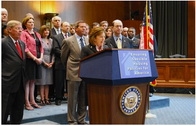Advertisement
Lawmakers, Consumer Groups and Industry Groups Call for Federal QRM Downpayment Revision

U.S. Senators Johnny Isakson (R-GA), Kay Hagan (D-NC) and Mary Landrieu (D-LA), Reps. John Campbell (R-CA) and Brad Sherman (D-CA), along with the Coalition for Sensible Housing Policy have hosted a news conference calling on federal regulators to revise their proposed 20 percent downpayment requirement for qualified residential mortgages (QRMs) set forth by Section 941 of the Dodd-Frank Act. The lawmakers reiterated that the regulators' proposed rule would shut out responsible homebuyers and further cripple the housing market.
The Coalition for Sensible Housing Policy is comprised of more than 40 consumer and industry groups united in opposing the proposed 20 percent downpayment rule and that share the goal of giving American families access to affordable mortgages. Members of the coalition include the American Bankers Association, Center for Responsible Lending, Independent Community Bankers of America (ICBA), Consumer Federation of America, Credit Union National Association, Mortgage Bankers Association, Mortgage Insurance Companies of America, National Association for the Advancement of Colored People (NAACP), National Association of Federal Credit Unions, National Association of Home Builders, National Association of Realtors, National Fair Housing Alliance, National NeighborWorks Association and the National Urban League.
"Drawing on over 30 years of experience in the real estate business, I understand the devastating consequences this proposed rule would have on qualified, creditworthy homebuyers and our fragile housing market," said Sen. Isakson. "I am thoroughly disappointed that the regulators did not follow our legislative intent and instead are promulgating a rule that would restrict access to affordable mortgages in this country. We don't have a down payment problem in this country, but rather an underwriting problem. I strongly urge regulators to rework their overly rigid down payment requirement for QRM. If left as is, it would make recovery in the housing market almost impossible."
Sens. Isakson, Hagan and Landrieu have spearheaded the call for QRM reform, calling upon regulators several times to revise the proposed 20 percent downpayment requirement, insisting that the regulators did not follow the senators’ legislative intent and explicit recommendations to require a sensible downpayment. In March, the lawmakers led a bipartisan group of 39 senators in writing a letter urging federal regulators to avoid restricting credit to middle class families working to own a home. The letter was addressed to a number of federal regulators, including Shaun Donovan, Secretary of the U.S. Department of Housing & Urban Development (HUD); Ben S. Bernanke, Chairman of the Board of Governors of the Federal Reserve Board (FRB); Sheila Bair, Chairman of the Federal Deposit Insurance Corporation (FDIC); Mary L. Schapiro, Chairman of the Securities & Exchange Commission (SEC); John Walsh, Acting Comptroller of the Office of the Comptroller of the Currency (OCC); Edward J. Demarco, Acting Director of the Federal Housing Finance Agency (FHFA); and Timothy Geithner, Secretary of the U.S. Department of the Treasury.
The Senate co-signers of the letter have called the proposed QRM regulation "unduly narrow" and reiterated that "well underwritten loans, regardless of downpayment, were not the cause of the mortgage crisis."
More than 250 members of the U.S. House of Representatives have also joined together to write a subsequent letter opposing the QRM rule, arguing that the proposed QRM "would particularly harm first-time and minority homebuyers." House members urged regulators "to consider lower downpayment loans that have mortgage insurance (MI) as constituting a QRM."
“We believe the QRM exemption should be sufficiently broad to encompass the majority of the residential mortgage market, consistent with strong underwriting standards,” said Camden R. Fine, president and chief executive officer of the Independent Community Bankers of America (ICBA). "In particular, ICBA has serious concerns with the 20 percent downpayment requirement for qualified borrowers. Such a high downpayment requirement will be particularly hard for first-time and lower income borrowers to meet—borrowers who have the ability to meet their mortgage obligations but have not been able to save such a significant amount."
In the Senate, Sen. Isakson, Hagan and Landrieu worked together to include a provision exempting QRMs from a requirement in the Dodd-Frank Act that requires originators to retain at least a five percent interest in loan pools, known as risk retention, sold to investors. Their legislation was intended to ensure that highly qualified homebuyers have access to affordable home loans.
"The Qualified Residential Mortgage definition regulators have proposed is so restrictive it threatens to cut off millions of otherwise eligible consumers from the dream of owning a home, and will drive the bulk of real estate lending in this country to the largest institutions that enjoy the lowest cost of capital," said Rep. Sherman. "That's why Congressman Campbell and I persuaded over 280 of our House colleagues to sign a letter to regulators opposing the rule as it has been drafted."
Sen. Kay Hagan (D-NC) leads the charge for federal reconsideration of the 20 percent QRM downpayment rule as defined by Section 941 of the Dodd-Frank Act
About the author





